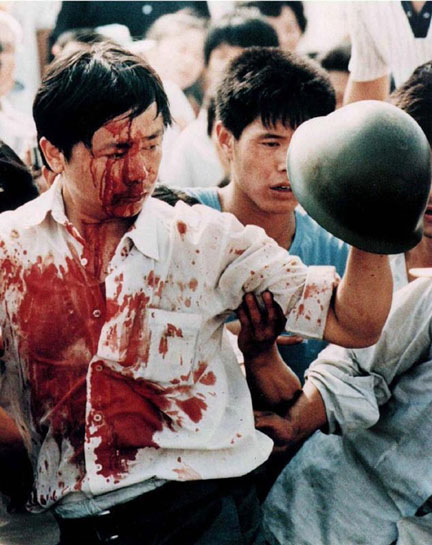As commemorations of the 25th anniversary of the Chinese government’s crackdown on pro-democracy protesters in Tiananmen Square in 1989 continue, a University of British Columbia law professor who was in Beijing at the time wants people to think about the causes the students were fighting for and what has — and mostly hasn’t — happened to their demands since then.
 “The issues that the students were protesting about . . . are still the issues people are unhappy with today,” says Pitman Potter, a B.C. professor who was then working at Peking University and as a lawyer in Beijing at the time.
“The issues that the students were protesting about . . . are still the issues people are unhappy with today,” says Pitman Potter, a B.C. professor who was then working at Peking University and as a lawyer in Beijing at the time.
Citing issues such as corruption and abuse of power raised by the protesters, Pitman says: “The tragedy of it is best remembered by thinking about what were the issues then and what they are today.”
Despite economic advancement and social improvements, the concerns about human rights remain, says Potter.
“The progress has been minimal,” he says.
While the Chinese government has engaged in a high-profile crackdown on corruption, Pitman says it’s mostly about austerity when it comes to high-profile examples of improper spending by officials.
“It’s really a focus on the appearance rather than the reality,” he says, citing limited improvements in government accountability.
Pitman, who watched from his window as the tanks rolled towards the square in 1989, notes that at its beginning, the student movement wasn’t about opposing the Communist party. When he arrived in China in 1987, then-party general secretary Hu Yaobang had taken a conciliatory approach towards the students.
“As a result of that, he was purged,” says Potter, who notes the Tiananmen protests followed Hu’s death in 1989. “What the students wanted was to be recognized as a patriotic reform movement” offering “loyal criticism” of the status quo, he adds.
Officials, of course, saw it differently as they ordered the military to descend on the square. Heeding the advice of others, Potter stayed inside about a kilometre from where the crackdown was happening.
“I saw more than I really would have liked to, to be honest,” says Potter, who notes he has generally decided to stay clear of any involvement in the protest movements due to concern about Chinese government claims of foreign interference.
He does, however, support the idea of a truth and reconciliation commission to deal with what happened, something the Chinese government has shown no enthusiasm for, especially given its determination to silence discussion of what happened in 1989.
“To a very large extent, I think 1989 demonstrated what the regime wanted to demonstrate,” he says, referring to the government’s intolerance of dissent.
 “The issues that the students were protesting about . . . are still the issues people are unhappy with today,” says Pitman Potter, a B.C. professor who was then working at Peking University and as a lawyer in Beijing at the time.
“The issues that the students were protesting about . . . are still the issues people are unhappy with today,” says Pitman Potter, a B.C. professor who was then working at Peking University and as a lawyer in Beijing at the time.Citing issues such as corruption and abuse of power raised by the protesters, Pitman says: “The tragedy of it is best remembered by thinking about what were the issues then and what they are today.”
Despite economic advancement and social improvements, the concerns about human rights remain, says Potter.
“The progress has been minimal,” he says.
While the Chinese government has engaged in a high-profile crackdown on corruption, Pitman says it’s mostly about austerity when it comes to high-profile examples of improper spending by officials.
“It’s really a focus on the appearance rather than the reality,” he says, citing limited improvements in government accountability.
Pitman, who watched from his window as the tanks rolled towards the square in 1989, notes that at its beginning, the student movement wasn’t about opposing the Communist party. When he arrived in China in 1987, then-party general secretary Hu Yaobang had taken a conciliatory approach towards the students.
“As a result of that, he was purged,” says Potter, who notes the Tiananmen protests followed Hu’s death in 1989. “What the students wanted was to be recognized as a patriotic reform movement” offering “loyal criticism” of the status quo, he adds.
Officials, of course, saw it differently as they ordered the military to descend on the square. Heeding the advice of others, Potter stayed inside about a kilometre from where the crackdown was happening.
“I saw more than I really would have liked to, to be honest,” says Potter, who notes he has generally decided to stay clear of any involvement in the protest movements due to concern about Chinese government claims of foreign interference.
He does, however, support the idea of a truth and reconciliation commission to deal with what happened, something the Chinese government has shown no enthusiasm for, especially given its determination to silence discussion of what happened in 1989.
“To a very large extent, I think 1989 demonstrated what the regime wanted to demonstrate,” he says, referring to the government’s intolerance of dissent.







